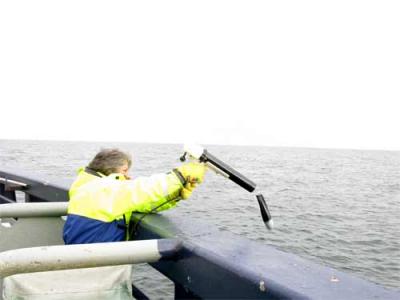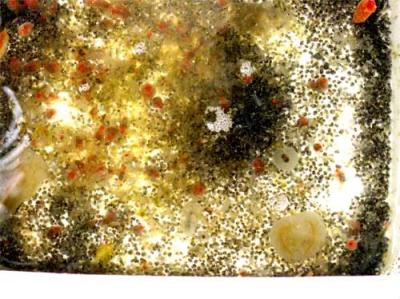Latitude: 77 degrees Longitude: 170 degrees Temperature: -4.8 degrees C Wind Chill: -12.9 degrees C
Well, we survived the past 48 hours of rock and rolling in the Ross Sea! The turbulent movement is best described as being in a bumper car and being hit continuously from all sides! Of course, the veteran oceanographers tell me "this is nothing, back in..." It was too difficult to read or do computer work again, so I joined a couple of others downstairs to watch The Blue Planet. Pretty interesting effect watching the ocean on screen and actually feeling it! Back in the cabin later, I decided to time the vibrations. From the moment of the initial impact until the time when the body and ship quit shaking was on average 25 seconds (the longest was 44 seconds) then the next one hit! And on and on...you get the picture! Yesterday's rolls also set the distance record for how far the water sloshed out of our shower stalls' 5cm deep bottom. The water hit the far wall of our bathroom 138cm away! Rebecca reported waves reaching the 4th floor deck yesterday as she went out to secure things. During the same outing, the wind blew her glasses off her face! Believe it or not, they actually found them later!
But today's a new day! The seas have calmed down, we can see slivers of blue sky again, and for the first time in almost 6 weeks, we can see land! The Ross Island is visible from the ship. We have stopped here for water sampling, and everyone seems happy to get out again to do it. It may be a long day, but time is running out to do science work onboard. And now with Ross Island in the distance the urgency is evident.
First Sighting of Ross Island
 It may not look like much but it's the first sighting of land in almost 6 weeks, and it looked great to us!!*
It may not look like much but it's the first sighting of land in almost 6 weeks, and it looked great to us!!*
It felt good to go out on deck. The wind chill has gone from -23.7 yesterday to a mere -12.9 today-a good summer day! Sharon Stammerjohn was going to the aft deck to launch an XBT and I went along. An XBT, Expendable Bathy Thermograph, is another instrument used to measure temperature like the CTD. The difference is that it is a single cylinder launched from the lower deck. A copper wire measures resistance that is transmitted to a computer, which is also keeping track of time. These measurements are then converted to depth and temperature readings. Another expendable, XCTD, uses two wires and measures both temperature and conductivity. These expendables are used because they are relatively inexpensive, they can be deployed from a moving ship, and it helps to fill in the gaps from one station to another. They have also been dropped with each CTD cast to calibrate against the sensors on the CTD.
XBT Launch
 Lollie launches the XBT.
Lollie launches the XBT.
Another first happened with the plankton tow. For the first time, we had an incredible number of zooplankton in one catch! Amphipods, copepods, Pteropods, jellies and krill. We had not seen this much biology from a net tow to date.
Best Catch
 Look at all the different kinds of zooplankton!!*
Look at all the different kinds of zooplankton!!*
The last first occurred in the wee hours of the New Year. The bridge reported a radio contact with another human onboard another ship! First time a voice other than ours had been heard since Punta Arenas!!
I think another CTD cast is underway, so I'd better go see what's going on outside. You may have noticed that a lot of the same people are involved in helping with different jobs. With so much going on, someone always can use another pair of hands, so we help wherever we can. Tomorrow we should be closer to Ross Island. Mt. Erebus has given us some good photo ops this evening, but I'll wait and see if I can get a closer shot tomorrow. Even at this distance, it looks awesome!
Lollie

